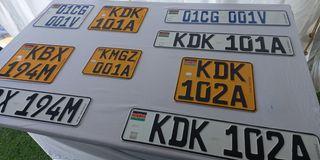Premium
Sh20, 000 fine or six months in jail if you don't get digital number plates

The new digital number plates by Government. They will boast of a QR code, hologram, NTSA serial number (front diff from back plate) and Kenyan flag.
Motorists face a fine of up to Sh20,000 or a jail term of six months if they fail to apply for a new digital number plate in the next 18 months.
The new number plates, which will be installed on cars, motorcycles and trailers, are aimed at stopping double registration of vehicles and taming unscrupulous car importers as the country moves to restore sanity in the motor industry.
The enforcement of the new directive will see the government collect over Sh12 billion given motorists and motorcyclists pay Sh3,000 each for the smart number plate.
Official data shows Kenya had 3.9 million registered vehicles at the end of 2020.
“Any person who contravenes any of the provisions in the traffic rules, which no specific penalty is provided, is liable for a fine not exceeding Sh20,000 or imprisonment for six months or both,” states the Traffic Act.
The new generation number plate is fixed with a radio frequency identification (RFID) microchip embedded on the sticker to facilitate wireless transfer of information between it and mobile police readers or at traffic lights.
The push for the smart plates comes amid concerns about increased duplication of the current ones by tax-evasion cartels and criminals.
The computerised number plates that have anti-counterfeit features, including holograms, watermarks, and laser markers, are expected to make it easier for the police to trace information on particular vehicles and their owners.
Microchip-coated vehicle number plates have been used in other countries to find stolen vehicles.
Interior Cabinet Secretary Fred Matiang’i said the issuance of the new plates will begin with the newly registered vehicles from the KDK series.
The plates are linked to the vehicle chassis number with several inbuilt security features that are easily identifiable to law enforcement and comply with international standards.
“Commissioning of the new generation number plates marks a historic moment in securitising vehicle registration by eliminating loopholes exploited by financial fraudsters and unscrupulous motor vehicle importers,” said Dr Matiang’i.
The Cabinet Secretary said replacement on existing vehicles will start from October 1 with Kenyans given 18 months to comply with the new directive.
The number of car and motorcycle registrations is currently growing at nearly 400,000 per year, with bikes accounting for over 70 percent of the listings.
“There are stickers that were placed in vehicle windshields a while back, but there are no scanners to read them. We hope that as they are rolling out these plates, there will be enough scanners to perform the required task,” said Charles Munyori, the secretary-general of Kenya Auto Bazaar Association.





